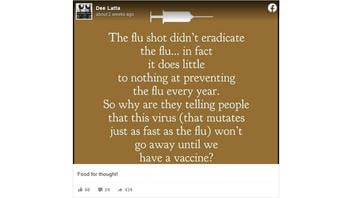
Is it true that the flu shot did not "eradicate" the flu and, in fact, does "little to nothing at preventing the flu every year?" No, that is not true. The flu shot, according to the Centers for Disease Control and Prevention, helps keep the flu hospitalizations and intenstive care unit cases down while preventing the flu in millions of people. The Infectious Diseases Society of America draws the same conclusion.
The claim appeared as a meme (archived here) where it was published by Facebook on April 17, 2020, under the title "Food for thought!" It read:
The flu shot didn't eradicate the flu... in fact it does little to nothing at preventing the flu every year. So why are they telling people that this virus (that mutates just as fast as the flu) won't go away until we have a vaccine?"
This is what the post looked like on Facebook at the time of writing:
The claim that the flu shot didn't eradicate the flu and hardly moves the needle on flu outbreaks every year is misleading. While the flu is not "eradicated," it is significantly less-deadly due to the flu shot that is administered more than 100 million times each year. But the success rate can depend on the year, as new flu strains develop that require new testing and vaccines.
According to the CDC, a 2017 study "showed that flu vaccination reduced deaths, intensive care unit (ICU) admissions, ICU length of stay, and overall duration of hospitalization among hospitalized adults with flu."
A CDC study the following year, in 2018, "showed that a vaccinated adult who was hospitalized with flu was 59 percent less likely to be admitted to the ICU than someone who had not been vaccinated. Among adults in the ICU with flu, vaccinated patients on average spent 4 fewer days in the hospital than those who were not vaccinated."
Here are more statistics about the flu shot from the CDC:
Flu vaccination can keep you from getting sick with flu.
• Flu vaccine prevents millions of illnesses and flu-related doctor's visits each year. For example, during 2017-2018, flu vaccination prevented an estimated 6.2 million influenza illnesses, 3.2 million influenza-associated medical visits, 91,000 influenza-associated hospitalizations, and 5,700 influenza-associated deaths.
• During seasons when the flu vaccine viruses are similar to circulating flu viruses, flu vaccine has been shown to reduce the risk of having to go to the doctor with flu by 40 percent to 60 percent."
And here are details from the CDC about the number of flu vaccines that were expected to be given during the 2019-2020 season:
Flu vaccine is produced by private manufacturers, so supply depends on manufacturers. Vaccine manufacturers have projected that they will supply as many as 162 million to 169 million doses of influenza vaccine for the 2019-2020 season."
Citing CDC studies, the Infectious Diseases Society of America, released this statement (italics are from the original statement):
The influenza (flu) vaccine can not only prevent illness that may cause a week or more of misery, it can reduce the likelihood of hospitalization in children and death in adults, according to two analyses of Centers for Disease Control and Prevention (CDC)-supported U.S. influenza surveillance data being presented at IDWeek 2019.
The first study supports the benefit of flu vaccination in preventing severe outcomes in children. Children who received the influenza vaccine were half as likely to be hospitalized with flu as those who didn't get vaccinated, according to the study, which followed more than 3,600 children over two seasons.
The second study looked at more than 43,000 older adults hospitalized with flu over five seasons and found that vaccination reduced the risk of severe outcomes - including death, pneumonia, intensive care admission and mechanical ventilation - by more than one-third.
"These studies add to the evidence that influenza vaccines prevent serious complications from flu," said Angela P. Campbell, MD, MPH, FIDSA, FPIDS, lead author of the study in children and medical officer in the Epidemiology and Prevention Branch of the Influenza Division at the CDC, Atlanta. "They show just how important it is that everyone six months and older who is eligible to get a flu vaccine does so every year."
The second part of the meme's text is suggestive and an open question at this point since, as of April 28, there was no approved vaccination for use against the novel coronavirus, according to the CDC and the World Health Organization. That part reads:
So why are they telling people that this virus (that mutates just as fast as the flu) won't go away ntil we have a vaccine?"
Minus a vaccine, there is no way of telling if it will, in fact, have any impact or eradicate the coronavirus, which has been blamed for more than 1 million cases and over 58,000 deaths in the United States alone as of April 28.
Medical professionals have stated that a vaccine would be the best way to treat the coronavirus outbreak. From the Mayo Clinic
A vaccine to prevent coronavirus disease 2019 (COVID-19) is perhaps the best hope for ending the pandemic. Currently, there is no vaccine to prevent COVID-19, but researchers are racing to create one.
Diseases have, however, been eradicated or severely limited using vaccines throughout history. Consider that one person died in the United States from Ebola in 2014. A vaccine has since been approved by the FDA in the United States, according to the CDC.
Ebola Virus Disease (EVD) is a rare and deadly disease in people and nonhuman primates. The viruses that cause EVD are located mainly in sub-Saharan Africa. People can get EVD through direct contact with an infected animal (bat or nonhuman primate) or a sick or dead person infected with Ebola virus
The U.S. Food and Drug Administration (FDA) has approved the Ebola vaccine rVSV-ZEBOV (tradename "Ervebo") for the prevention of EVD. The rVSV-ZEBOV vaccine has been found to be safe and protective against only the Zaire ebolavirus species of ebolavirus.
And then take smallpox:
Thanks to the success of vaccination, the last natural outbreak of smallpox in the United States occurred in 1949. In 1980, the World Health Assembly declared smallpox eradicated (eliminated), and no cases of naturally occurring smallpox have happened since.
Smallpox research in the United States continues and focuses on the development of vaccines, drugs, and diagnostic tests to protect people against smallpox in the event that it is used as an agent of bioterrorism.














